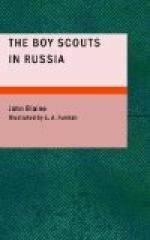Ernst nodded.
“Things are done so in Russia—sometimes,” he said. “Not always, but they are possible, for a great noble. Well, I have seen things nearly as bad in my own Prussia! I shall have to see what may be done for you. If you reach Berlin, your ambassador will be able to help you, yes?”
“I am quite sure of it,” said Fred, eagerly. “I don’t want to trouble you, but if you could help me to get there—”
A soldier interrupted him. He stepped up to Ernst, saluted, and, permission given, spoke in the officer’s ear. Ernst started.
“One minute,” he said. “I am called away—I will return in one minute.”
The minute dragged itself out. In all directions there was a rising sound, confused, urgent. Fifteen minutes passed. Then a soldier came to Fred.
“The lieutenant will see you inside,” he said, gravely.
Fred followed him. Ernst, his face sober, but with shining eyes, spoke to him at once.
“War has been declared,” he said. “War between Germany and Russia! My young friend, you are in hard luck! The train from which you were expelled is the last that will even start for Berlin until the mobilization is complete.”
Outside there was a sudden rattle of rifle fire. Fred stared at the German officer.
“That is the beginning,” he said. “We happen to have the stronger force here. We are taking possession of the Russian side of the border station! I wish we might catch Suvaroff—he is a good soldier, that one at least, and worth a division to the Russians. But there’ll be no such luck. He’ll have got away, of course—a fast motor, or some such way. And they’ve got more troops close up than we have.”
And still Fred stared. He seemed unable to realize that this popping of rifles, this calm, undemonstrative series of statements by an unexcited German officer, meant that war had come at last—the European war of which people even in America had talked for years as sure to come!
“As for you, I meant, of course, to lend you the money and let you go on to Berlin,” said Ernst. “Now I can lend you the money, but there will be no trains. You can’t stay here. The Russians, I think, will advance very quickly, and it will not be here that we shall try to stop them, but further back and among the lakes to the south. Even if there is a concentration, however, foreigners will not be wanted.”
“What shall I do?” asked Fred.
“You speak German?”
“Yes.”
“Then I shall lend you some money—what I can spare. You can start back toward Koenigsberg and Danzig. Your consul will be able to help you. You can walk and the people will gladly sell you food.”
“Yes, and thank you for the chance, I’m a Boy Scout; I won’t mind a hike at all.”
CHAPTER II
UNDER ARREST
So it was arranged for Fred Waring, thousands of miles from home, to start from Virballen. The lieutenant who had saved him from Suvaroff lent him what money he could spare, though all told it was less than a hundred marks, which is twenty dollars.




